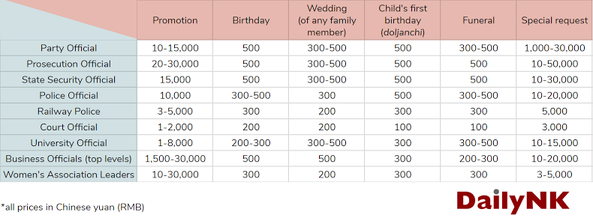Corruption is on the rise in North Korea as orders from the regime to acquire “loyalty payments” have been handed down to cadres throughout the year. In order to collect these funds, cadres have been extracting money ordinary citizens in the form of bribes.
Corruption has long been a staple feature of North Korean society, and has only grown under Kim Jong Un’s more hands-off approach to the growing market economy. Bribes have even become formalized under labels of various market fees, and people have become familiar with the new systems.
Cadres are taking advantage of the unstable political atmosphere, cooking up an atmosphere of fear to openly exploit people and take their money using Kim Jong Un’s directives as a pretense. When people complain to cadres that a certain bribe demand is not in line with Kim Jong Un’s directives, they simply deny the accusations. People have begun sarcastically referring to these cadres as clones of Kim Jong Un.
“People working in the government are using their vested authority under Kim Jong Un to come up with all kinds of reasons to demand money from ordinary residents. When cadres receive orders to ‘overcome sanctions’ through fundraising, their first consideration is how they can extract bribes from citizens,” a source in North Korea told Daily NK on December 21.
Cadres exploiting their positions for personal gain are also unlikely to be punished for their actions, although some are occasionally punished to “set an example.” One reason for the lack of consequences is that these bribes filter up through the ranks, as each cadre is expected to give at least half of the bribes they receive to their immediate supervisor, essentially ensuring that everybody is “in it together.”
Low-ranking cadres fulfill the demands (bribe quotas) of higher-ranking cadres, who in turn cover for the low-ranking members who are out collecting bribes from the people – creating a symbiotic relationship within the ranks. Naturally, it’s the ordinary citizens who suffer the most under this system. The high-ranking cadres ignore the massive amount of corruption occurring at lower levels and cover up complaints from citizens.
“Every time the authorities start talking about eliminating corruption, they give lectures on the topic, but the bribery culture continues unabated. Such lectures have never put a dent in the belief that our country is the ‘bribery republic,’ rather than the People’s Republic,” the source said.
“At every level of authority including the prosecutors’ office, MSS, MPS, etc., individuals are amassing unimaginable wealth through the extraction of bribes. Cadres have found a way to make an easy living through corruption, but ordinary people continue to lead difficult lives,” he added.
Another effect of the bribery system is that cadres compete with each other over who can present the greatest amount in “loyalty payments” to their supervisors. Those who do not offer enough money risk being labeled a “counterrevolutionary” and punished accordingly.
As Kim Jong Un loses more sources of foreign currency due to international sanctions, the pressure for cadres to procure money through bribes is set to increase.
The culture of corruption is not only isolated to the police and security agencies. Those in positions of power in education, medicine, and many other departments rely on bribes as a vital source of income as well. For example, during the college entrance examination period, students are able to pass their exams and get into good schools by bribing education department officials. Judicial officials have also begun demanding more expensive bribes due to difficulties caused in part by increasing international sanctions.
Despite North Korea’s claims of a free healthcare system, various extra bribes are also prevalent throughout the process of acquiring medical supplies.
In addition to having to pay bribes to cadres on special occasions such as their birthdays and weddings, ordinary citizens must pay heavily to avoid forced mobilization on farms or construction sites. Even the inminban (people’s unit or neighborhood watch) leaders on the lowest end of the authority structure are constantly finding ways of extracting bribes.
The situation has become so severe that North Koreans now consider their country – from Kim Jong Un at the top, all the way to the bottom of society – to be completely consumed by bribery culture.



















